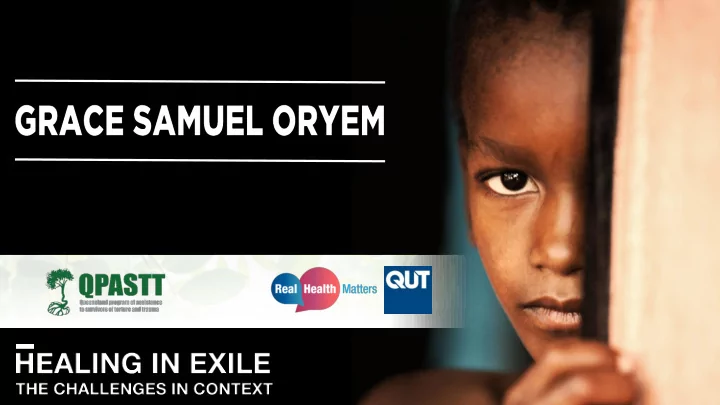

The Role of Community in Recovery By Grace Samuel Oryem
Trauma and Recovery • Trauma Centre of Australia defines trauma as “life threatening events, a psychological wound that has occurred due to a person’s perception of a stressful.” • The Queensland Department of Health defines recovery as “ gaining and retaining hope, understanding of ones abilities and disabilities, engagement in an active life, personal autonomy, social identity, meaning and purpose in life and a positive sense of self”.
The impacts of trauma • Trauma has long-lasting effects on survivors, their families and communities, can disrupt disconnections with people and the world • The negative impact of torture can reduce the capacity of individuals to resettle and integrate into a new society. • Some individuals are extraordinarily resilient, while, others may experience long-term personality changes. • The disconnection with others is detrimental to the recovery process of trauma survivors, their health and wellbeing. • Redeveloping connection with others is a critical step to recovery.
Culture and trauma • Certain African traditions contribute to the misconception of trauma. • As a result, symptoms of trauma can be linked to witchcraft, curses, ancestral spirits, and punishment for bad deeds. • There’s a variety of sub communities within the African cultural context, consequently, the experience and management of trauma differs for every community.
Recovery • A holistic approach and the combination of professional social services, and community support are essential in the healing and recovery of those affected by traumatic stress. • Narrative method is commonly used to understand belief systems and identify approaches that may help individuals and community heal. • Community support systems help survivors to recover through cross-cultural and spiritual counselling, engagement and support on a daily basis.
Community support • Providing survivors with a network of support within the community helps in restoring the connection with their families, and the community • Sharing stories and personal experiences of trauma with other survivors assists in creating a sense of community, and alleviates the loneliness often experienced by survivors . (example a story) • Elders and cultural leaders use cultural counselling with survivors, to help them reconnect, re- establish relationships and build self-esteem.
Community Support (cont.) • Provide social support, visitations, connections, helping with some basic needs and creating a friendly atmosphere for restoration of body and mind. • Strengthening by using personal support system, allows survivors to talk and share their story. Recounting the traumatic details helps to dispel the feeling of distress attached to their memories. • Encouraging survivors including those with complex cases to see professional counsellor, while reassuring them of safety and continuous support in processing the painful emotions.
Community Support (cont.) • Some survivors of torture are not comfortable to share their story or attend counselling. For example some South Sudanese women said they are not comfortable because it reminds them of past painful experience. However, they use singing as a mechanism of coping with the traumatic stress (SBS).
Community Support (cont.) • In some cultures, in order to cope with war experiences and move forward with their role in the community, the survivors must undergo traditional rituals that cleanse them of the things they have done and witnessed.
Spiritual support • Depending on the religious background of the person, the religious leaders can give guidance and support to the survivor. These leaders play a vital role in 1. Spiritual counselling 2. Reassuring survivors of a better tomorrow 3. Referring to biblical/Islamic stories and verses that survivors can relate to and gain encouragement. 4. Outreach; having an open door for survivors to come at anytime for prayers & worship, meditation and activities 5. Support i.e. free shop, food bank and transport
Conclusion • In general community members, elders, religious leaders pay major role in supporting survivors cope through: – Awareness – Referral to services and social activities – Providing support to individuals and their families – Visitation and help when required.
Recommend
More recommend